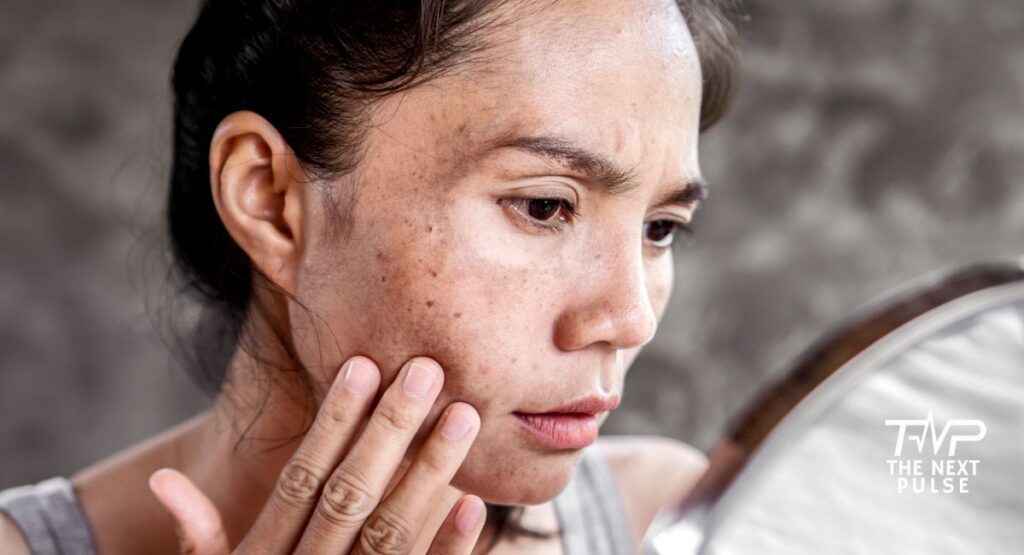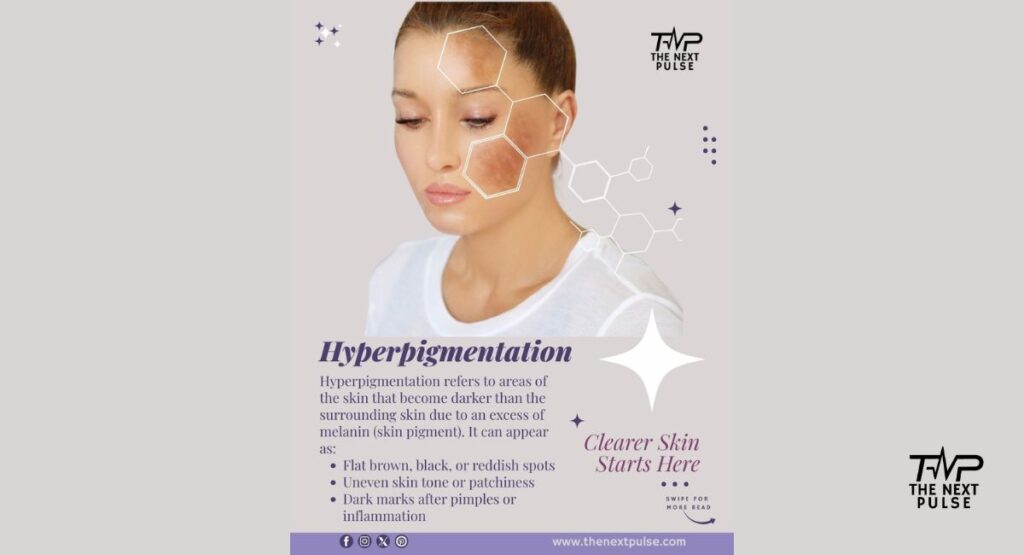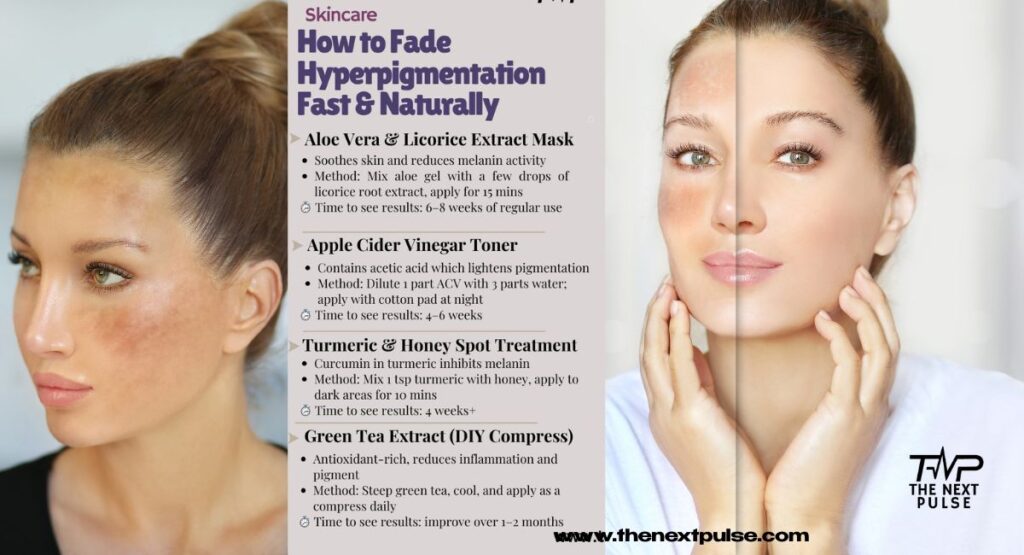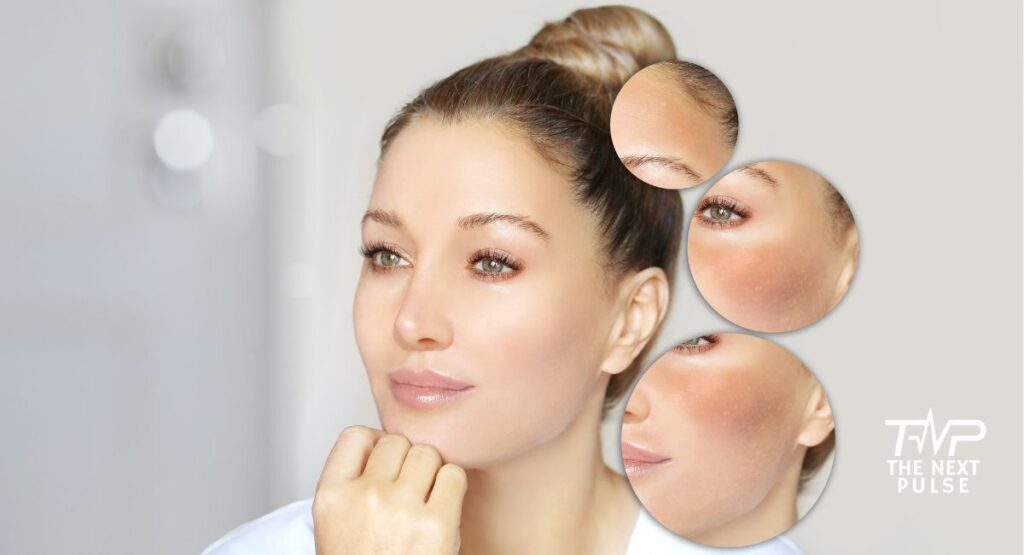Introduction
You know that moment when you’re staring in the mirror like, why won’t these spots just leave already?
Yeah, I’ve been there too.
Dark patches, acne scars, random sun spots, darker patches on the skin—hyperpigmentation loves to show up uninvited and can make your complexion look uneven, dull, or prematurely aged. And the worst part? They take forever to move out. Doesn’t matter if it came from a pimple, pregnancy hormones, or just too much time outside, the result is the same: uneven skin that makes you feel older, duller, or just plain annoyed.
Whether you’re battling post-acne scars, melasma, or sunspots, hyperpigmentation affects millions of people worldwide. And it’s not just about looks—it can impact self-confidence, makeup choices, and how comfortable you feel in your own skin
But here’s the good news: you can fade them. Not overnight, not with magic potions from TikTok, but with stuff that’s proven, safe, and yes—doable at home or with a dermatologist. Let me break down what actually helps and what’s just hype..

Why You’ll Love This Guide
- Dermatologist-approved solutions that really work
- Natural home remedies backed by science
- Skincare and lifestyle tips to prevent pigmentation
- Honest, simple answers to your biggest questions
Understanding Hyperpigmentation

What Is Hyperpigmentation?
Hyperpigmentation happens when the skin produces excess melanin—the pigment that gives your skin its color. This results in dark patches or spots that look different from your natural skin tone.
Common Types of Hyperpigmentation
| Type | Appearance | Common Causes |
| Post-Inflammatory Hyperpigmentation (PIH) | Dark spots after acne, eczema, or injury | Skin trauma, acne, inflammation |
| Melasma | Brown or gray-brown patches (often on cheeks, forehead, or upper lip) | Hormonal changes, pregnancy, birth control |
| Sunspots (Lentigines) | Small brown freckles or age spots | Long-term sun exposure |
| Scarring Pigmentation | Uneven dark marks on healing wounds | Cuts, burns, eczema |
What Triggers It?
- Sun Exposure: UV rays overstimulate melanin production.
- Hormonal Shifts: Pregnancy, menopause, or birth control can trigger melasma.
- Skin Trauma: Acne, eczema, or picking at pimples.
- Medications: Certain drugs (chemotherapy, antibiotics).
- Genetics: More common in medium to deep skin tones.

Medical Solutions for Hyperpigmentation (Dermatologist-Recommended)
1. Topical Treatments
These are often the first-line treatments.
- Hydroquinone
- Gold standard skin lightening agent.
- Inhibits melanin production.
- Best used under medical guidance (risk of irritation).
- Retinoids (Tretinoin, Adapalene)
- Boost cell turnover.
- Fades discoloration gradually.
- Also helps prevent acne.
- Azelaic Acid
- Anti-inflammatory, safe for all skin tones.
- Excellent for acne scars & rosacea.
- Vitamin C
- Powerful antioxidants.
- Inhibits melanin & brightens skin.
- Must be paired with sunscreen.
- Kojic Acid & Licorice Extract
- Plant-based alternatives to hydroquinone.
- Mild, but effective over time.
2. In-Clinic Procedures
Used when creams aren’t enough.
- Chemical Peels (Glycolic, Salicylic, TCA) – remove top skin layers to reveal fresh skin.
- Laser Treatments – break pigment clusters, best for lighter skin tones.
- Microneedling – stimulates collagen & boosts absorption of brightening serums.
- IPL (Intense Pulsed Light) – targets redness & brown pigmentation.
Important: Always consult a dermatologist. Some treatments can worsen pigmentation on darker skin.
Home Remedies for Hyperpigmentation (Science-Backed)

1. Aloe Vera + Licorice
- Contains aloin and glabridin, natural depigmenting agents
- How to Use: Mix pure aloe vera gel with a few drops of licorice extract and apply as a mask for 15 minutes, 3–4 times/week
- Time to Results: 6–8 weeks
2. Green Tea Compress
- Rich in antioxidants that fight inflammation and oxidative stress
- How to Use: Brew green tea, cool it, and apply it with a cotton pad for 10 mins daily
- Time to Results: 4–6 weeks
3. Turmeric & Honey
- Curcumin in turmeric suppresses melanin; honey hydrates
- How to Use: Mix 1 tsp turmeric with 1 tsp honey; apply as a spot treatment for 10–15 mins
- Time to Results: 3–4 weeks (avoid overuse, can stain skin)
4. Apple Cider Vinegar
- Acetic acid lightens pigmentation, but must be diluted
- How to Use: Mix 1 part ACV with 3 parts water, apply with cotton ball at night
- Time to Results: 4 weeks (Discontinue if irritation occurs)
| Remedy | How to Use | Results Timeframe |
| Aloe Vera + Licorice | Mix aloe gel with licorice extract, apply 15 mins, 3–4x/week | 6–8 weeks |
| Green Tea Compress | Apply cooled tea with cotton pad for 10 mins daily | 4–6 weeks |
| Turmeric + Honey | Mix 1 tsp turmeric + honey, apply 10–15 mins | 3–4 weeks (may stain) |
| Apple Cider Vinegar | Dilute 1:3 with water, apply at night | 4 weeks (stop if irritation occurs) |
Tip: Natural remedies take time—be consistent and always patch test first.
Skincare & Lifestyle Tips to Prevent Hyperpigmentation
Daily Skincare Habits
- Apply broad-spectrum SPF 30+ daily (indoors & outdoors).
- Gentle cleansing + mild exfoliation.
- Add antioxidants like Vitamin C or Niacinamide.
- Use moisturizer at night to heal skin faster.
Lifestyle Do’s & Don’ts
- Eat antioxidant-rich foods (berries, greens, omega-3s).
- Stay hydrated + manage stress.
- Don’t pick pimples.
- Limit sun exposure (especially midday).
Dermatologist Pro Tip:
“Sunscreen is your #1 anti-hyperpigmentation tool. It prevents new spots and protects your results. Use SPF daily, no matter the weather or your skin tone.”

Top 5 FAQs About Hyperpigmentation
- Can hyperpigmentation fade on its own?
Yes, mild spots may fade in 3–6 months with sun protection. - Is it worse in darker skin tones?
It’s more common & persistent, but safe treatments exist. - Can stress or lack of sleep cause pigmentation?
Indirectly, yes—stress hormones can trigger melasma or acne. - Does Vitamin C really work?
Yes, it helps lighten spots & prevent new ones. - When’s the best time to treat pigmentation?
Night is best for activities like retinoids & acids. Morning is best for Vitamin C + SPF.
Final Thoughts
Hyperpigmentation doesn’t have to control how you feel about your skin. With the right combination of dermatologist-approved treatments, natural remedies, and consistent SPF use—you can fade dark spots, brighten your complexion, and regain confidence.
Remember: Every skin is unique. Be patient, treat it gently, and consult a dermatologist if pigmentation doesn’t improve within 3–4 months.
Healthy, glowing, even-toned skin is possible—with consistency and the right care, you’ll get there.
- Related Guide: How to Control Oily Skin Naturally
- Related Guide: How to Fix Slow Hair Growth Naturally
- External Resource: American Academy of Dermatology – Hyperpigmentation

2 thoughts on “How to Treat Stubborn Hyperpigmentation Naturally & Professionally: Dermatologist-Approved Remedies and Prevention Tips”